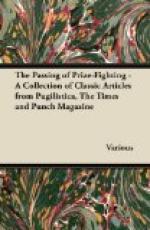The scene is laid in the House of Commons, where Sir FREDERICK BANBURY has moved the rejection of the Poets and Verse (Nationalisation) Bill.
Sir FREDERICK BANBURY is speaking.
But it stands to reason,
If you propose to pay them just the same
Whether they write a little or a lot,
They won’t write anything. There
will not be
Sufficient stimulus. It’s human nature,
And human nature is unchangeable.
Do you imagine, Sir, that KEATS or SHELLEY
Would have produced such valuable work,
So large an output, if this precious Bill
Had been in operation at the time?
We should have had no SHAKSPEARE. And, besides,
It means the death of British poetry,
Because we can’t continue to compete
With foreign countries.
A Labour Member. I am not a lawyer
Nor I am not a manufacturer,
But earned my bread these five-and-forty years,
Sweating and sweating. I know what sweat
is....
An Hon. Member.
You’re not the only person who has sweated.
Labour Member.
At any rate I sweated more than you did.
Mr. SPEAKER.
I do not think these constant interruptions
Are really helping us.
Labour Member. So you may take
it
That what I utter is an honest word,
A plain, blunt, honest and straightforward word,
Neither adorned with worthless flummery
And tricks of language—for I have no
learning—
Nor yet with false and empty rhetoric
Like lawyers’ speeches. I am not a
lawyer,
I thank my stars that I am not a lawyer,
And can without a spate of parleying
Briefly expound, as I am doing now,
The whole caboodle. As for this here Bill,
So far as it means Nationalising verse,
We shall support it. On the other hand,
So far as it means interferences
With the free liberty of working-men
To write their poetry when and how they like,
We will not have the Bill. So now
you know.
Mr. ASQUITH.
It was remarked, I think by ARISTOTLE,
That wisdom is not always to the wise;
To which opinion, if we may include
In that august and jealous category
The President of the Board of Ululation,
I am prepared most freely to subscribe.
When was there ever since the early Forties
A more grotesque and shameless mockery
Of the austere and holy principles
Which Liberalism like an altar-flame
Has guarded through the loose irreverent years
Than this inept, this disingenuous,
This frankly disingenuous attempt;
To smuggle past the barrier of this House
An article so plainly contraband
As this unlicens’d and contagious Bill—
A Bill which, it is not too much to say,
Insults the conscience of the British Empire?
I will not longer, Sir, detain the House;
Indeed I cannot profitably add
To what I said in 1892.
Speaking at Manchester I used these words:—
“If in the inconstant ferment of their




